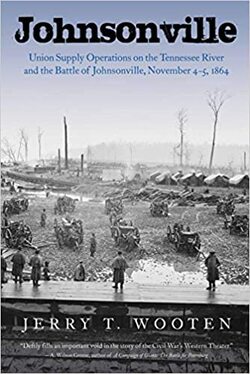
Jerry T. Wooten
Savas Beatie, 2019, 224 pages, $29.95
ISBN: 978-1-61121-477-2
Image courtesy of amazon.com
The obscure in the American Civil War has found its place in the past few years and we have gained a great deal of unknown. For me, I see this is an opportunity to delve deeper into a scholarship that has already reached a great height. For the most part, the American Civil War’s codex is massive, and it continues to grow. So when a book like Johnsonville comes to us, it can be seen as not only a boon to the study, but a chance to expound upon our current knowledge. So let’s take a look at what this book offers, and why is can be seen as important to the current state of American Civil War academia.
Jerry T. Wooten is a former park ranger at the Johnsonville State Historical Park. He is the Park Manager for the Bicentennial Capitol Mall State Park in Nashville and served as a Director of State Historic Sites for the Tennesse Historical Commission. He was also a Park Historian at the Pamplin Historical Park and National Museum of the Civil War Soldier in Petersburg. He has written and researched the American Civil War for most of his life, and speaks frequently at Civil War roundtables and museums.
As I had said in the introduction to this review, most people see the name Johnsonville and don’t think much of it. Wooten has brought us something quite unique in this study about not only the creation and use of the supply depot for the Western Theater of the war, but the battle that occurred in 1864. But this depot was much more than initially thought. It served as a strategic location for logistics that made much of the victory in the west possible. I found one of the more interesting portions of this book was about the Emancipation’s Proclamation not only in Johnsonville but in Tennessee as well. Wooten mentions the recruitment of African Americans, mainly the six regiments that Major Sterns created. The trail leading to the battle of this important depot is also fascinating since we have very few books dedicated to this conflict. Most of what has been covered in the past deals with the Confederate side of the battle, but Wooten delves all of his knowledge into bringing an even-tempered study to the ranks of this field. You see the great importance to how this fight affected the Union during this point in the war, and how it hampered some of their own operations moving forward.
I highly recommend this book to anyone interested in the Western Theater of the Civil War. I think that Wooten has delivered an in depth account not only of the battle that occurred there, but the operations that Johnsonville aided during its time as a depot. I think that this study will be held up as an example of how one should look at the world of depots and their importance to the war. Too often we focus on battles, but rarely do we look at supply. Here, that is taken in at full strength and I appreciate the attention brought to this place.
 RSS Feed
RSS Feed
